Exploring 'The Most Dangerous, Exciting, Edgy Place' With the Brilliant Jane Campion
We could listen this filmmaking icon talk forever.
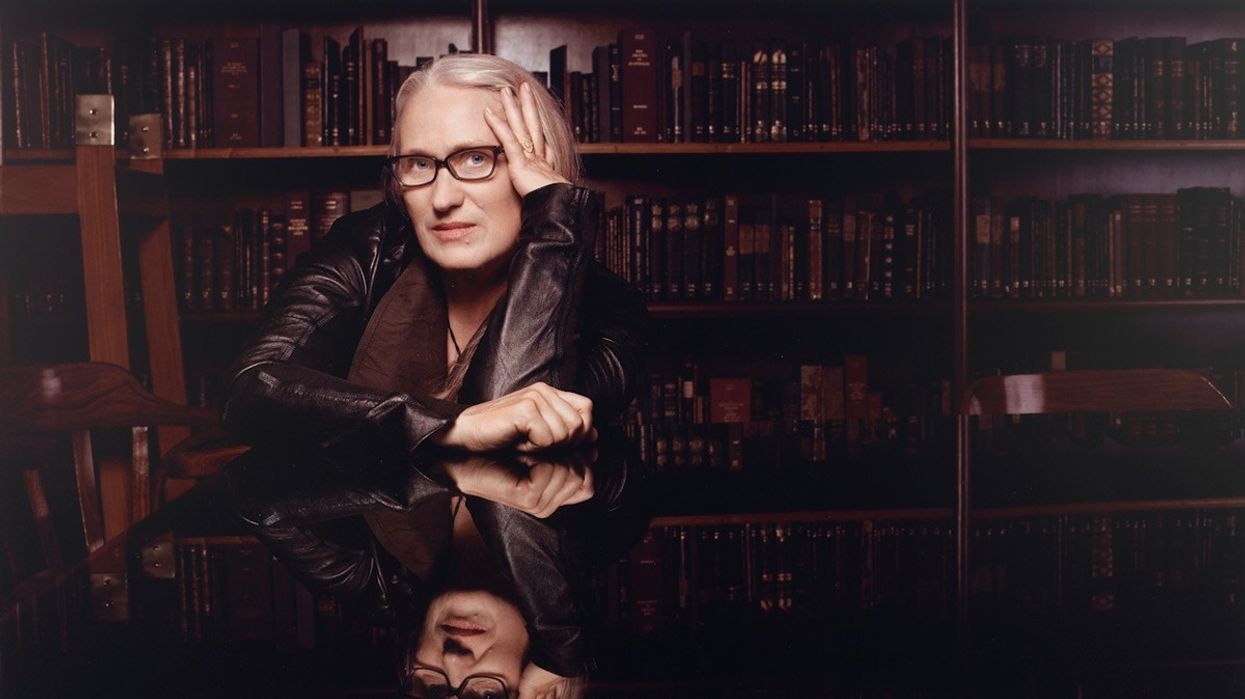
Jane Campion has never had a retrospective. Jane Campion, arguably the most successful female director—the only woman in possession of a Palme d’Or, the second of four female Oscar-winning directors, and the creator of one of the most popular indie films of all time—has never had a retrospective. Until now.
In honor of the premiere of Top of the Lake: China Girl, the second season in Campion’s award-winning detective drama, The Film Society of Lincoln Center is running a week-long exhibition of Campion’s full career. It ends this Sunday. The retrospective features every single one of Campion’s films on 35mm, as well as some of her shorts on 16 and Super 8.
The event kicked off with “An Evening With Jane Campion,” where the director unpacked her career with moderator Dennis Lim. Together they discussed Campion’s writing techniques, her fandom for David Lynch, how she took ecstasy with the Brontës, and how she’s been a stalwart of feminism for the span of her 35 years in the film industry. Read the best moments from the night below.
TV is where the freedom lies
Top of the Lake is not Campion’s first foray into television, though it is her most commercially successful. Angel at My Table was originally conceived for TV, despite ultimately garnering a theatrical release. Lim commenced the discussion by asking about Campion’s return to TV and her approach to the format. “The motivation for doing Top of the Lake was I that really love novels,” The filmmaker began. “I love that length and was dying to have a chance to explore more character lines.”
She recalled having an epiphany about the format upon seeing an episode of Deadwood. “I rose from my chair and I went, ‘Oh my god, they’re letting them do this?!’ It was so brave and amazing, incredible, and raw.” Campion continued, “This is where the freedom is. This is where they let you do what you want.”
To Campion, it was far freer than the film industry. “Cinema was, at that time, in a bit of a crisis where it was always concerned about will this character be likeable? Will these story lines be likeable?”
“When I first fell in love with cinema, it felt like the most dangerous, exciting, edgy place you could explore ideas. But as time went on it felt like a more and more conservative pleasing event.”
“Were those questions you heard early in your career?” The moderator asked.
Not at all. “When I first fell in love with cinema, it felt like the most dangerous, exciting, edgy place you could explore ideas. But as time went on it felt like a more and more conservative pleasing event.” Conservative is not Campion’s scene. “And that, for me is just not inspiring in the same way.”
New Zealand was no longer inspiring
It turns out that Campion was not as keen as you’d think to write the follow-up to her wildly successful mini-series. “I remember thinking, ‘Oh man, it’s a lot of work.’” She said. But it was her long-time collaborator Gerard Lee who ultimately convinced her. Over the phone, Gerard had railed, ‘You owe it to the world. You have to do it. People need to work, they need jobs.’”
Campion’s response? “‘Well, we’ll have to think of some ideas!’” She was totally burnt out on New Zealand. In her words, “I felt like a lot of those themes of the wilderness and paradise, and that rough, raw, female-male thing that was going on there, it felt like I’d explored it in some kind of basic way.”
That’s when she began to contemplate moving the show to Sydney. What if Robin had a hard time in Paradise? What if her life fell apart? What if the only way she could kickstart it again was to go back to the force? That line of questioning is what brought Campion to season two.
She added that after Robin’s experience with Tui in season one, Campion felt it was time for Robin to explore her own motherhood. “I find it very romantic and very beautiful, but also completely mysterious, what it must be like to have adopted out a child and carried the thought of that child so particularly for the seventeen years. And for Mary (Robin’s daughter) to have in her mind that mythical mother.”
On writing re-defining an age-old scene
At this point in the discussion, they halted to play a clip from Top of the Lake: China Girl, where Robin first meets her seventeen-year-old daughter. In reality, actress Alice Englert is Campion’s daughter. “Did you have Alice in mind as you were writing?” asked Lim.
“Yes, I did,” answered Campion. “When I did the math, and worked out that this was a part that Alice could play, I was really excited about it because Alice has been wanting to be an actor since she was about 13. One of the ways we bonded together was when Alice got scripts to do auditions, and I’d work on it with her. It’s a beautiful adult platform for a teenaged girl and parent to work together on.” She added, “It’s not inspired by her life but it’s inspired by her talent.”
With respect to the scene itself, Campion stated that it was perhaps one of her favorites to write, ever. “I love it because it’s such a clichéd event. It’s hard to imagine how you can put any air in something like that.” That was a challenge Campion was willing to take. “My desire was to turn it around somehow, to make it really tender and surprising.” She described her process in gastronomical terms. “You know, when I have to write something like this, I’m stirring it up like some yummy thing in the fridge.” Or maybe it’s more like Hygge. “I’m just waiting for that moment when you get the book, the rainy day outside, the cookies, and it all comes together like the perfect storm.
“The great thing with crime stories is that the truth really matters. Someone’s dead, something’s actually happened. Somehow the truth really is vibrant.”
The crime genre has high stakes truth
After two seasons of Top of the Lake as well as her Meg Ryan film, The Cut, we can now say that Campion is a bona fide purveyor of crime stories. Why does she like the genre so much? Lim wondered. “The great thing with crime stories is that the truth really matters. Someone’s dead, something’s actually happened. Somehow the truth really is vibrant,” Campion said. She likes imagining all of the hundreds of options that surround the one concrete event. And she added, it takes the viewer’s humanity to a dark place. “Any act that any human being does, I think, challenges us to imagine yourself doing it.”
And then on the flip side, you have your hero. “What I love about Robin Griffin particularly is that, as a woman, I think she holds that feeling of being overlooked as a person. And that the the people she has supported are innocents, and people without power. In a way, she’s kind of restituting the self as well as the victims.”
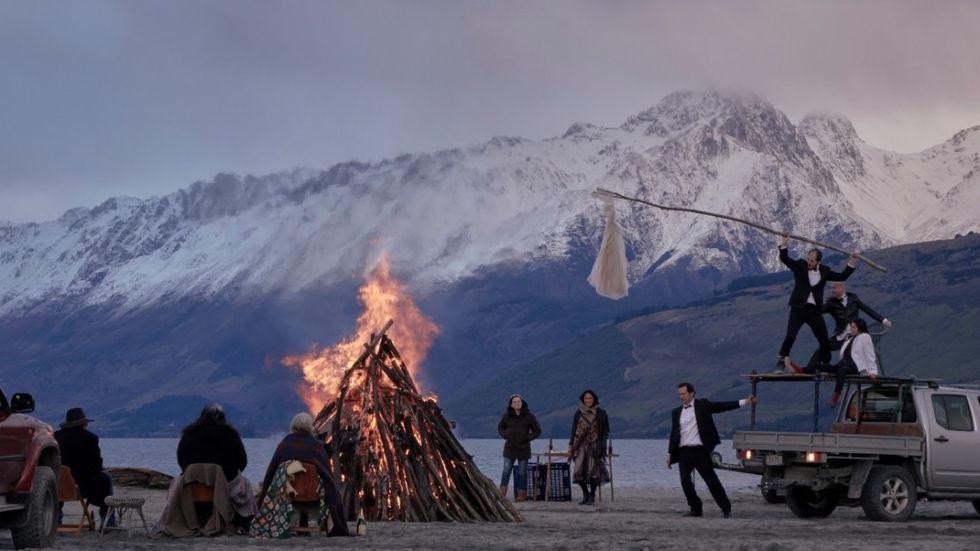
Normal misogyny
If you can’t tell by now, Campion is warm and bubbly, and most of all mischievous. There came a moment in the panel when she poked fun at moderator Dennis Lim, for his awkward wording. He began, “The other thing about your series is that the victims are often women and there are these violent misogynist crimes. It’s very clear that it requires you to imagine these misogynist crimes, characters, environments, which are very present in both Top of the Lake season one…”
“That’s just kind of normal…” Campion interjected.
“This season too, there’s a pretty misogynist police force that Robin finds herself in,” Lim tried to continue his question.
“That’s quite normal…” Campion shot back.
“I’m just wondering what it’s like for you to have to imagine these misogynist environments.”
“It’d be nice to just imagine them!” Campion laughed. The whole room in stitches.
“Maybe imagine’s not the word, but to put them on screen…” Lim recovered.
“I love it. I’ve got a bit of alpha male in me.” Campion responded, poking fun at herself as well.
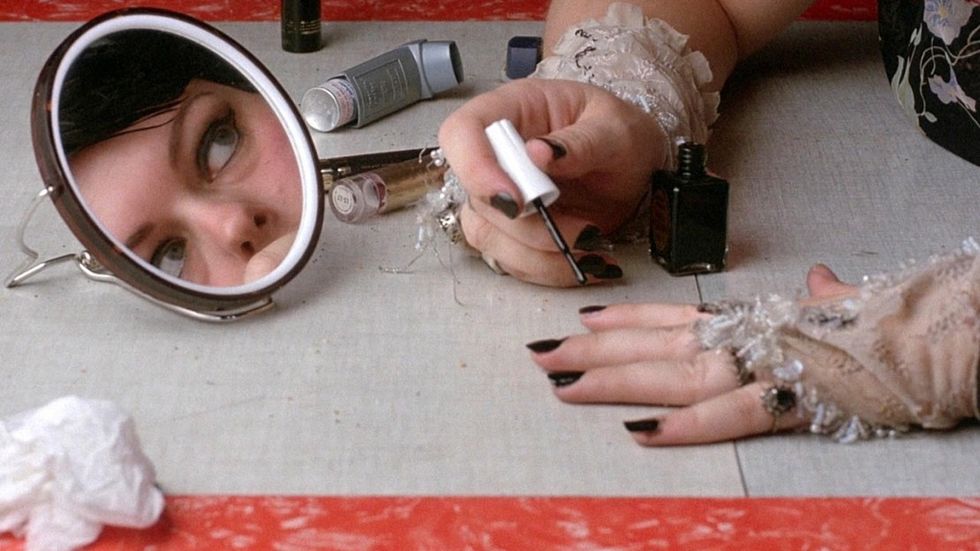
Getting the film bug
At this point, they paused to watch a clip from Sweetie, Campion’s first feature from 1989. After a winding early life in Anthropology and Fine Art, Lim asked what lead Campion to filmmaking.
"I remember being in my underpants hanging pieces of film and my partner at the time going, ‘You coming to bed?’ and me going ‘yeah, yeah.’ I got really obsessive."
Turns out she started with plays, and eventually found herself filming them. She shot her first short on her art school’s super 8 camera, and edited everything by hand. “That’s when I really got the bug,” Campion said. “I could just work any number of hours on it. Any number. I mean, I remember being in my underpants hanging pieces of film and my partner at the time going, ‘You coming to bed?’ and me going ‘yeah, yeah.’ I got really obsessive.”
After art school, Campion had hoped to sell a script and start her career that way. But, like for many of us with that dream, it didn’t pan out. Unlike many of us, Campion was paid to go to film school. “We got $75 a week, which must be about $300 now. And they paid for your films too. The good old real egalitarian days, right?”
She didn’t know what a wide shot was
Despite feeling that filmmaking was “the best fun ever,” Campion had basically no clue what she was doing when she made her first film. “The beautiful thing about my first film is that I didn’t even know what a wide shot was.”
She recalled a time when she had shown her film to someone from the London Film School. “I always went around in my Datsun with a projector in case anyone wanted to see my film. And so, I brought it out and showed this guy and he had this big black beard, a was bit of a chubster, and he was going ‘yeah, yeah.’”
“I thought, ‘Wide shots? What the fuck is he talking about? They all fit on the same screen.’”
Campion described being shocked when he said the film could’ve used more wide shots. “I thought, ‘Wide shots? What the fuck is he talking about? They all fit on the same screen.’ I had no idea that there were different lenses. If it was in the frame, if there was a light reading on it, we would cheer!”
She added, “And actually, that was the beginning of my agony in filmmaking when I realized there were so many choices.”
David Lynch makes her happy to be human
When Lim asked about her influences, Campion named Lynch and Buñuel among others. “They were telling stories that were really interesting about being a human.”
For her, this was radically different from most of her young experience. “Mostly when you’re around in the world as a young person, it’s kind of boring. People are talking at you—what are you going to do? How’d you do at school and what are you doing next?”
“I would spend my life in the movie theater if I could.”
But the movie theater was a whole other world. “Then you go to the movies and there’s these people sharing this amazing quality of vision and view and you think, ‘Oh man, people are okay after all. Maybe it’s a great tribe to be a part of.’ I would spend my life in the movie theater if I could.”
Lim mentions that David Lynch also came to filmmaking from art school.
“He’s so extraordinary,” enthused Campion. “When I was at the Cannes Film Festival with all the directors, I just kept standing really near him and holding hands. He seemed to be quite happy about it. We’d turn this way and hold hands and then turn to the other side and hold hands for the photographers. It was like a little Hallmark for me.”
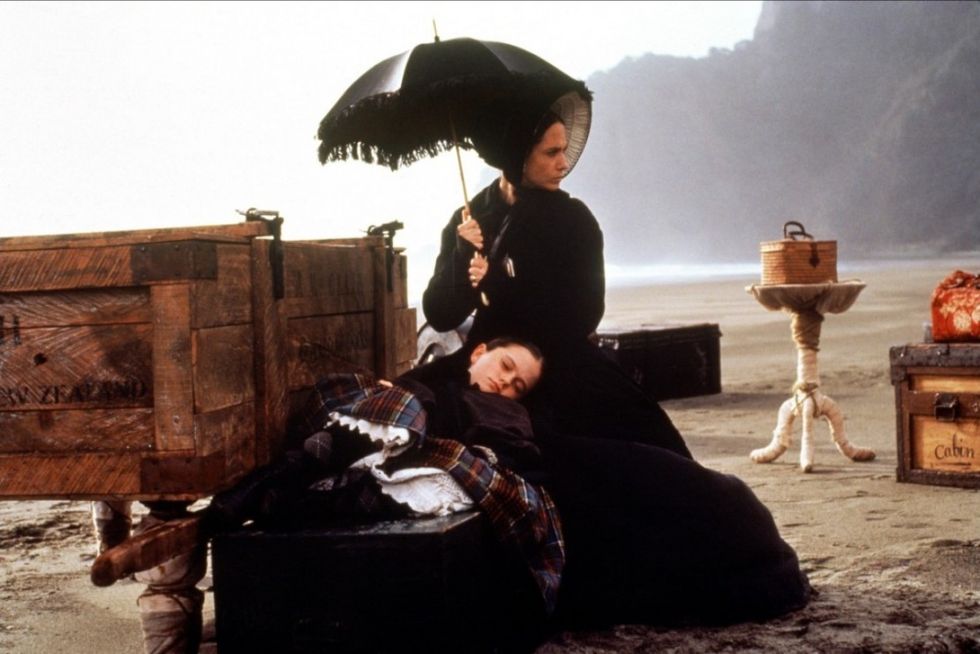
Why The Piano resonated with audiences
The conversation turned to The Piano, which remains Campion’s most commercially successful film. Not only that, it’s one of the most commercially successful independent films of all time. “Do you have a sense of what resonated so strongly with people in this film?” Lim asked.
“We were actually pretty surprised,” admitted Campion. “We just thought we were making an art-house movie which might have a little bit of a cross-over. At the same time, we met Harvey Weinstein then, and he was extraordinary in loving up these movies and bringing them to a wider audience. It was a time in film history I think that Harvey’s energy and his game-ness about it really was able to do that.”
Aside from the marketing aspect, Campion believes she struck a chord with the female perspective. “I guess it’s such a female point of view and the fact that [the main character] doesn’t speak; her stubbornness, and strength, her interiority, the piano speaking for her. I think it speaks a lot to women about not being given a voice in the world.”
“It’s really hard to audition for someone who doesn’t speak. What do you do, wander around the room looking mean?”
Holly Hunter had to fight for her role
Surprisingly, The Piano the world loves today almost never happened. Campion and her producer Jen Chapman wanted a tall actress, and Holly Hunter had to fight her way into the role. Campion recalled rejecting Hunter’s agent several times, on the premise that the character was just not written to be short. But after a third rebuff, Hunter still wanted the role, so Campion agreed to meet. “Holly came to my motel room. She sat on the bed, and it’s really hard to audition for someone who doesn’t speak. What do you do, wander around the room looking mean? So, we got her to do the voice over and just had the camera on her face.”
After the audition, Hunter handed Campion a tape of her piano playing. The director dismissed the whole thing until she was back in Sydney looking at audition tapes. Hunter’s tape came on and everyone in the room was transfixed. “It was extraordinary how mesmerizing her eyes her. That was something I didn’t realize when I was filming her but seeing her there, I just felt this connection, we all did. So, I put on the tape of her piano playing and she was extremely good. So, I was like… ‘well, I guess that character could be very tall or very small.’”
Campion was terrified of actors, but Harvey Keitel changed that
It turns out that Campion had a rough history with all her actors, at the beginning. “I started off terrified of them, that they would wreck my short films and scripts.” She felt too particular to let someone else take control of her words. “I would work with friends and then boss them around.”
But eventually, she knew she had to let go. That time came with The Piano. Campion recalled her first meetings with Harvey Keitel, and how he became her mentor. Now she’s in love with actors.
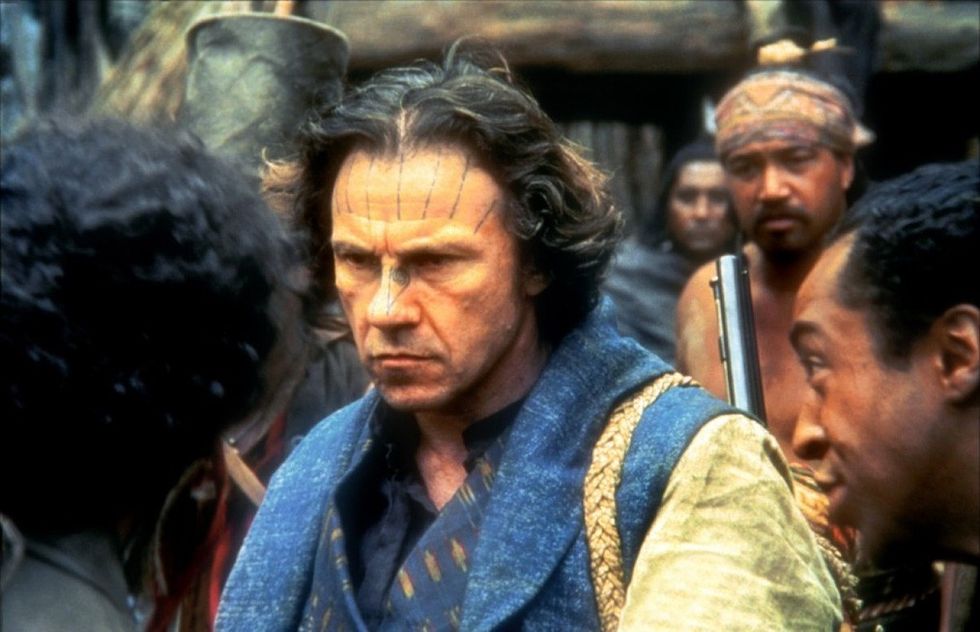
“The first discussion with Harvey about how we were going to run things was pretty extraordinary. I said to Harvey, ‘I’d really like you to play the role but how’s this going to work? You’re a much more experienced actor than I am a director, but I still want it to be my film. What do we do?’”
“And he said, ‘okay, Jane, what about we try this? You let me show you what I think should happen in the scene, and once I’ve done that, I will do anything you ask me.’ And I said, ‘well that sounds good.’”
Today, Campion’s practice is choosing actors whom she loves. She added that when an actor doubts themselves, remind them that they were chosen for a reason. “It’s a very big thing in life to be chosen.”
Ecstasy with the Brontës
The conversation was turned over to the audience, and one member asked if Campion would ever consider doing a rendition of Wuthering Heights. Though the answer is no; despite loving the novel, Campion said “it’s sort of Wuthered, isn’t it?” But she’s a huge Brontë fan. “Actually I often go to the Brontë Sisters house in Harwick and go down to their waterfall,” said Campion. “I even took ecstasy there with my sister. My first ecstasy. It was brilliant.”
If you want to learn something about the world, go to art school
When asked if she learned much feminist film theory in film school, Campion said not at all. “Film school’s a really conservative place. I’ve never met such a collection of ordinary folk in my life. Art school is pretty wild. Crazy wild. And that’s where I really learned everything.”
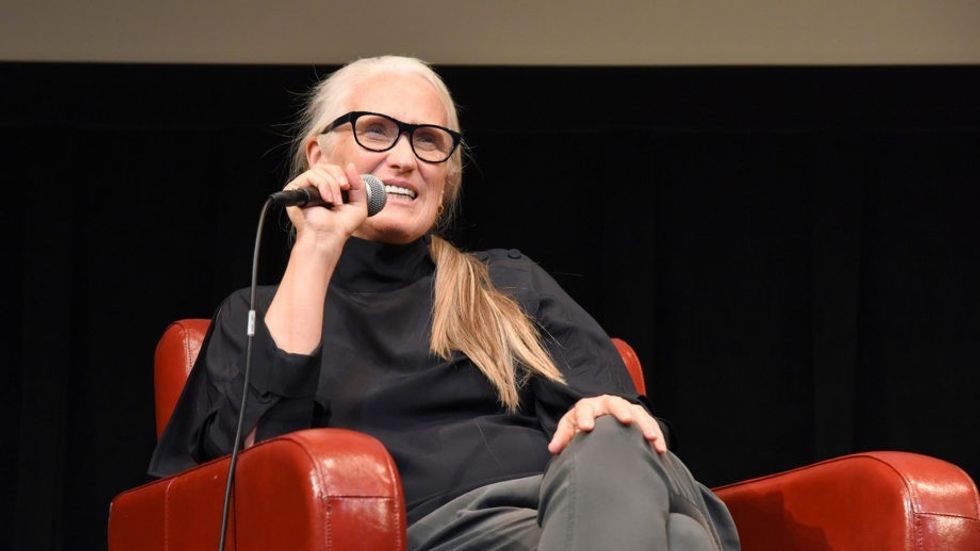
She wanted to scare the male filmmakers at Cannes
“It must annoy you that you’re often so repeatedly described as the only woman to have won a Palme d’Or. The festival’s nearly 60 years old, it’s quite absurd,” said Lim. “Yeah, it is.” Though Campion said that Cannes Film Festival has been really good to her, it doesn’t mean she didn’t try to change it. “The year that I was president, I suggested the idea that I should have an all-female jury. Because for the very first time, all those male filmmakers would have to think, ‘what are the women thinking?’”
Campion is controlled by her dreams
The last question of the night came from an audience member who wanted to know, “what’s your epiphany?” What drives you, Jane? “You know,” Campion answered, almost as if she couldn’t help it, “it’s the burden of dreams. I’m trying to be on holiday. And then sometimes something comes and it catches you. I feel like it’s done to me. I get taken by a mood or something that I can’t quite see the whole of, and so the journey is about discovering what that is, or getting closer to it.”
You can watch the full conversation here.

 'A Different Man'via A24
'A Different Man'via A24 'Bodies Bodies Bodies'via A24
'Bodies Bodies Bodies'via A24 'Past Lives'
via A24
'Past Lives'
via A24










